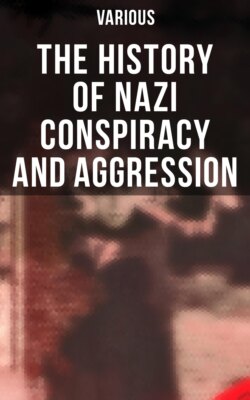Читать книгу The History of Nazi Conspiracy and Aggression - Various - Страница 19
На сайте Литреса книга снята с продажи.
V. POWERS OF THE TRIBUNAL AND
CONDUCT OF THE TRIAL
ОглавлениеTable of Contents
Article 17. The Tribunal shall have the power
(a)
to summon witnesses to the Trial and to require their attendance and testimony and to put questions to them,
(b)
to interrogate any Defendant,
(c)
to require the production of documents and other evidentiary material,
(d)
to administer oaths to witnesses,
(e)
to appoint officers for the carrying out of any task designated by the Tribunal including the power to have evidence taken on commission.
Article 18. The Tribunal shall
(a)
confine the Trial strictly to an expeditious hearing of the issues raised by the charges,
(b)
take strict measures to prevent any action which will cause unreasonable delay, and rule out irrelevant issues and statements of any kind whatsoever,
(c)
deal summarily with any contumacy, imposing appropriate punishment, including exclusion of any Defendant or his Counsel from some or all further proceedings, but without prejudice to the determination of the charges.
Article 19. The Tribunal shall not be bound by technical rules of evidence. It shall adopt and apply to the greatest possible extent expeditious and non-technical procedure, and shall admit any evidence which it deems to have probative value.
Article 20. The Tribunal may require to be informed of the nature of any evidence before it is offered so that it may rule upon the relevance thereof.
Article 21. The Tribunal shall not require proof of facts of common knowledge but shall take judicial notice thereof. It shall also take judicial notice of official governmental documents and reports of the United Nations, including the acts and documents of the committees set up in the various allied countries for the investigation of war crimes, and the records and findings of military or other Tribunals of any of the United Nations.
Article 22. The permanent seat of the Tribunal shall be in Berlin. The first meetings of the members of the Tribunal and of the Chief Prosecutors shall be held at Berlin in a place to be designated by the Control Council for Germany. The first trial shall be held at Nurnberg, and any subsequent trials shall be held at such places as the Tribunal may decide.
Article 23. One or more of the Chief Prosecutors may take part in the prosecution at each Trial. The function of any Chief Prosecutor may be discharged by him personally, or by any person or persons authorized by him.
The function of Counsel for a Defendant may be discharged at the Defendant’s request by any Counsel professionally qualified to conduct cases before the Courts of his own country, or by any other person who may be specially authorized thereto by the Tribunal.
Article 24. The proceedings at the Trial shall take the following course:
(a)
The Indictment shall be read in court.
(b)
The Tribunal shall ask each Defendant whether he pleads “guilty” or “not guilty”.
(c)
The prosecution shall make an opening statement.
(d)
The Tribunal shall ask the prosecution and the defense what evidence (if any) they wish to submit to the Tribunal, and the Tribunal shall rule upon the admissibility of any such evidence.
(e)
The witnesses for the Prosecution shall be examined and after that the witnesses for the Defense. Thereafter such rebutting evidence as may be held by the Tribunal to be admissible shall be called by either the Prosecution or the Defense.
(f)
The Tribunal may put any question to any witness and to any Defendant, at any time.
(g)
The Prosecution and the Defense shall interrogate and may cross-examine any witnesses and any Defendant who gives testimony.
(h)
The Defense shall address the court.
(i)
The Prosecution shall address the court.
(j)
Each Defendant may make a statement to the Tribunal.
(k)
The Tribunal shall deliver judgment and pronounce sentence.
Article 25. All official documents shall be produced, and all court proceedings conducted, in English, French, and Russian, and in the language of the Defendant. So much of the record and of the proceedings may also be translated into the language of any country in which the Tribunal is sitting, as the Tribunal considers desirable in the interests of justice and public opinion.
